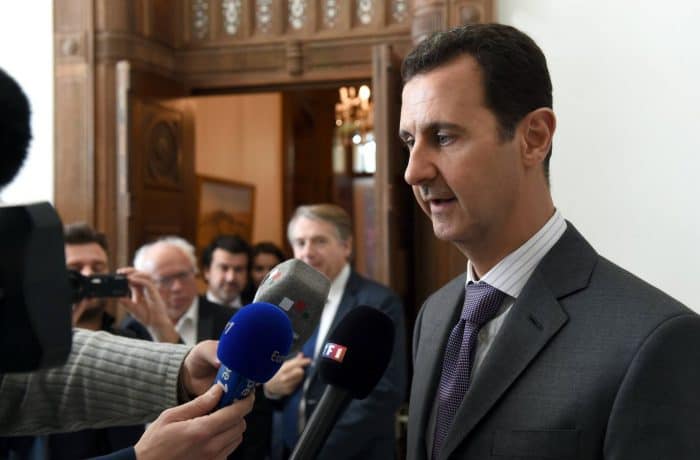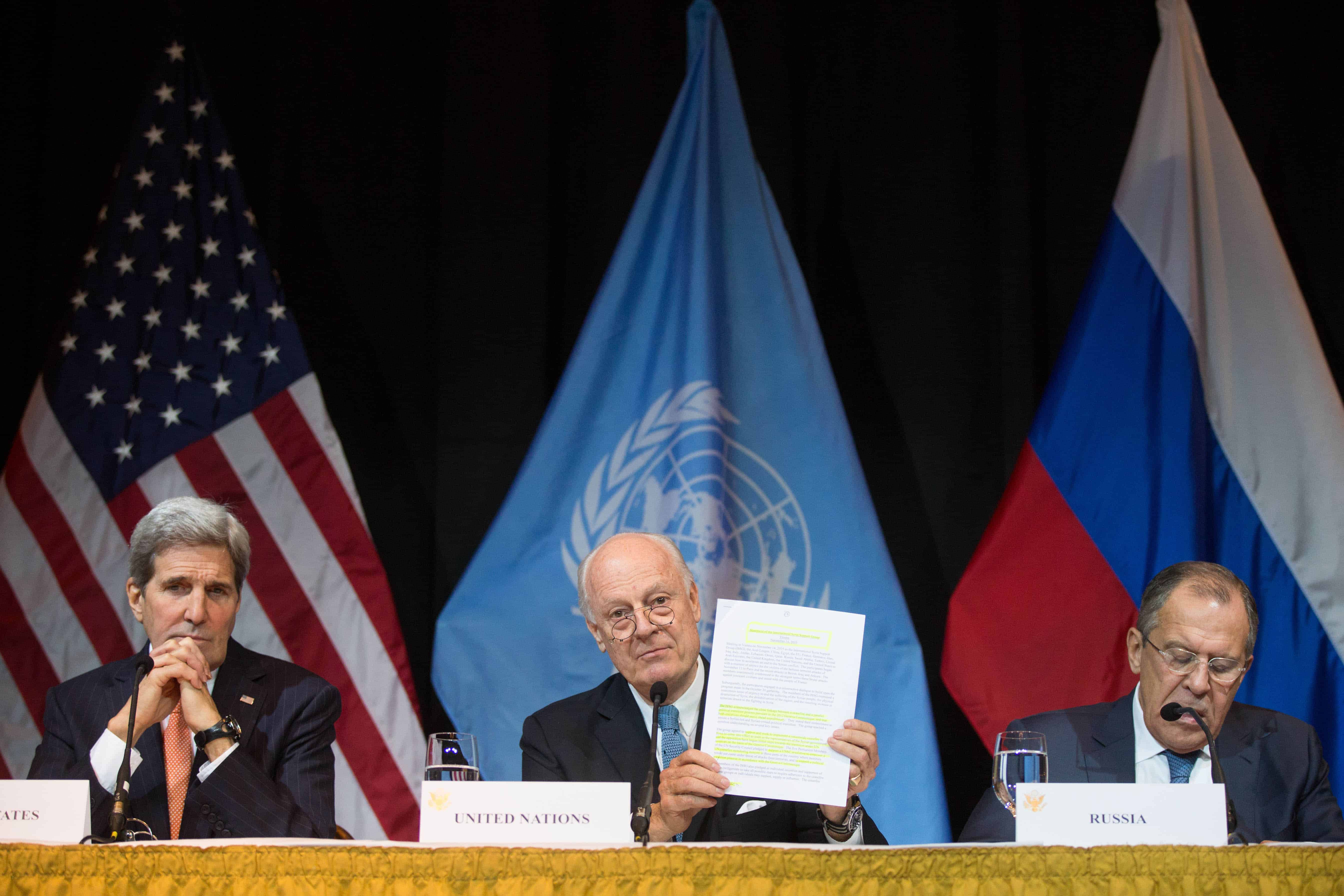VIENNA – World powers meeting here on the Syria crisis agreed Saturday to push for political negotiations between opposition forces and representatives of the government of President Bashar Assad by Jan. 1, to be followed by an immediate, U.N.-monitored cease-fire.
To facilitate the cease-fire, participants agreed during six hours behind closed doors that they will stop all support and supplies to “various belligerents” on both sides of the Syrian civil war once negotiations are underway.
Agreement among the United States, Russia and foreign ministers from the Middle East and Europe clearly gained impetus from their shared horror over Friday’s terrorist attacks in Paris. U.S. Secretary of State John Kerry said the carnage, claimed by Syria-based Islamic State, underscored “the urgency of the moment” for all participants to move beyond their continuing deep disagreements over Syria, including Assad’s responsibility for the growth of the militant movement, and whether he has any role in Syria’s future.
“We do agree on this. It’s time for the bleeding to stop,” Kerry said.
Russian Foreign Minister Sergei Lavrov, at a news conference with Kerry, said “we should not allow terrorism to take over the region just because the United States, Russia and the rest of the world cannot agree on things,” including their separate airstrike campaigns in Syria. While Russia says it is bombing the Islamic State, the Obama administration has said most of its strikes are hitting Syrian opposition forces fighting against Assad.
Kerry began the news conference with a lengthy statement, in French, directed at the people of Paris on the “visceral and unshakable bond between us.” The Islamic State has claimed responsibility, he said, and while “we are still gathering information, … we have seen nothing that leads us to a different conclusion.
Saturday’s meeting, the second in two weeks in a renewed international effort to forge a negotiated political solution in Syria that would allow both Russia and the U.S.-led coalition to focus their efforts on the Islamic State, began with a moment of silence for the Paris victims.
The agreement tasked the United Nations to supervise the negotiating process, including the formation of a governing council to assume executive powers in Syria, write a new constitution and hold elections – all within the next 18 months.
Assad’s government has already submitted a list of its negotiating representatives to the United Nations. But peace efforts in the past have stumbled over insistence by the U.S. and Arab-backed opposition that talks begin with explicit understanding that Assad will leave. Russia, Assad’s principal supporter along with Iran, has long argued the opposite. The question remains unsettled, and Kerry and Lavrov made it clear that they remain deeply divided.
Citing chaos in Iraq and Libya after the forced removal of dictators, Lavrov said, “I cannot agree … with the logic that Assad is the cause of everything” in Syria.
But Kerry agreed that decisions on Assad did not have to be made at the beginning of the process. “One of the reasons this war is now four years old,” he said, is that it has been the “policy of many of the countries, mine included, that Assad has to go. … I hope it will happen. I pray it will happen, because if it doesn’t happen, this war will not end.”

‘He doesn’t know how to tell the truth’
The hope is that the prospect of a cease-fire, and the threat of a cut-off of support, will focus minds on both sides. Once Syrians sit down at the table together, Kerry said, they will have the opportunity to make clear to each other that the Assad regime cannot continue. “It is not dictated by the United States, it’s going to evolve in the course of the conversation,” Kerry said. “And if it doesn’t, there won’t be peace. Our hope is that people will take advantage of this moment.”
The United States also appears to have dropped its objection to the participation in negotiations of opposition groups, supported by the Saudis and others, that Washington does not deem “moderate” enough for support.
Instead, worthy opposition groups will be those who agree to the cease-fire. Those groups that do not agree to stop fighting risk being branded terrorists, a designation that now is applied only to the Islamic State and Jabhat al-Nusra, al-Qaida’s Syrian affiliate.
“Saudi Arabia is a partner is this communique,” Kerry said. “They fully understand the rules of the road here.”
While striving for unity at their news conference, Kerry and Lavrov also clashed over their responses to Assad’s assertion Saturday, via the Syrian news service, that France provoked the Friday attacks, by its support for opponents to his government that Assad labels terrorists.
“I think that’s another reason why he’s not fit to be the leader of his country,” Kerry said of Assad. “He doesn’t know how to tell the truth to his public.” The Islamic State has spread in Iraq, he said, because Assad sent the country spiraling into chaos by attacking legitimate protesters to his rule.
“Assad has cut his own deal with Daesh,” Kerry said, using an Arabic term for the Islamic State. Assad is buying oil produced in territory held by the Islamic State, and has never attacked the militants as he wages war on his own people. “They are symbiotic, they are not real enemies in this,” he said.
Asked if his government agreed with Assad in blaming France, especially since his own country has been a recent victim of terror, with alleged Islamic State responsibility for the recent downing of a Russian airliner, Lavrov demurred.
“The Paris attacks have shown, alongside with ISIS claiming responsibility, that it doesn’t matter if you are for Assad or against him, ISIS is your enemy.” Lavrov demurred. Isis is another term for the Islamic State.
© 2015, The Washington Post






